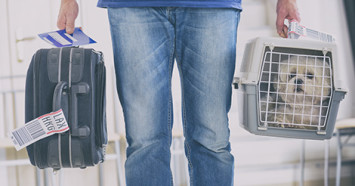
The decisions you make when creating a disaster plan that includes your pets will likely depend on the answers to a variety of questions. Those answers vary greatly on rules and resources available in your local community.
1. Where can you stay with your pets in an emergency situation?
There are many reasons you may choose not to stay in an emergency shelter, if you need to evacuate with your pets. Knowing your options in advance helps a lot – especially if the disaster is widespread. If you have a place to go, but that place is close enough to your home to be affected as well, then it doesn’t do you much good.
Figure out now if you have family, friends, and pet-friendly hotels available to you. Consider setting up temporary housing options that are five, 10, or even 20 miles or more from your home.
Sometimes family or friends who own an RV or camper-trailer can help with temporary housing, whether you borrow the RV in their driveway or take it to a nearby campground.
2. Is veterinary boarding or kennel boarding an option?
If a disaster is somewhat localized, your veterinary hospital or your usual boarding kennel may be able to help with short-term, emergency boarding. Spots will likely fill up fast or be greatly limited if the disaster affects a large area or happens during peak vacation season, but it helps to know in advance if this is even an option.
3. What are the local vaccination policies for evacuated pets?
Emergency animal shelters provide a tremendous service during disasters, if you need to evacuate but cannot find a place to stay that accepts pets. However, find out in advance what vaccination policies will be in place at these shelters.
I interviewed a veterinarian who was involved in evacuated animal care during severe flooding in Iowa several years ago, and the policy was to vaccinate all incoming pets with the core vaccines for dogs and cats. Period.
If you have strong opinions on over-vaccination or your pet cannot be vaccinated for any reason, such policies are an important thing to know long before you may need to use emergency animal shelters.
4. What are the names, doses, prescription, and pharmacy numbers for all of your pets’ medicines?
You may think you have this memorized, but I assure you that in an emergency, if you’re making a run for it and you’re under tremendous stress, the information may fly right out of your head.
Make a list and keep it with your emergency evacuation kit so you can get refills while evacuated.
5. Do all of your pets fit in one car (with or without crates)?
I’m a staunch believer in only transporting animals that are properly restrained in the car, but there may be such urgent evacuations – like in a wildfire – where you just need to GO!
I have an old SUV that easily holds two dog crates and our luggage, but I also have a small economical car that only holds one crate, and that’s about it. I once joked with my veterinarian about trying to squeeze both dogs without crates into the small car in an emergency. Her reply was something like, “I’m sure you’d make it work, if you had to.”
Know what will work, even in dire situations.